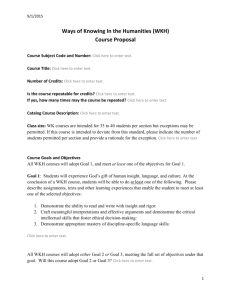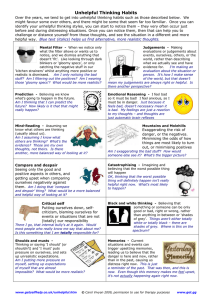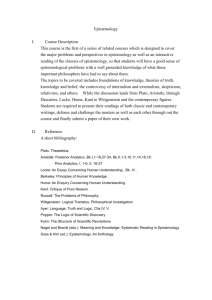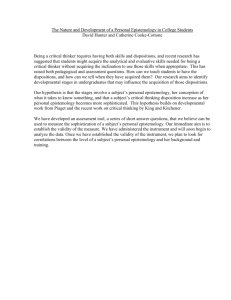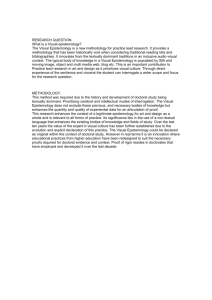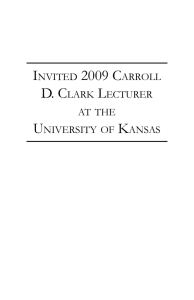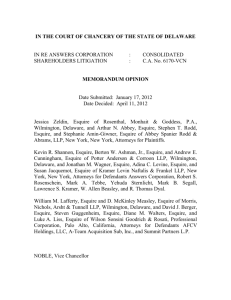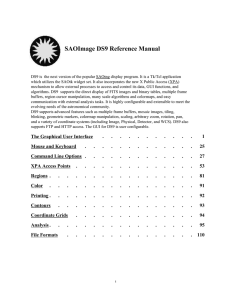Epistemology II – Hierarchy
advertisement
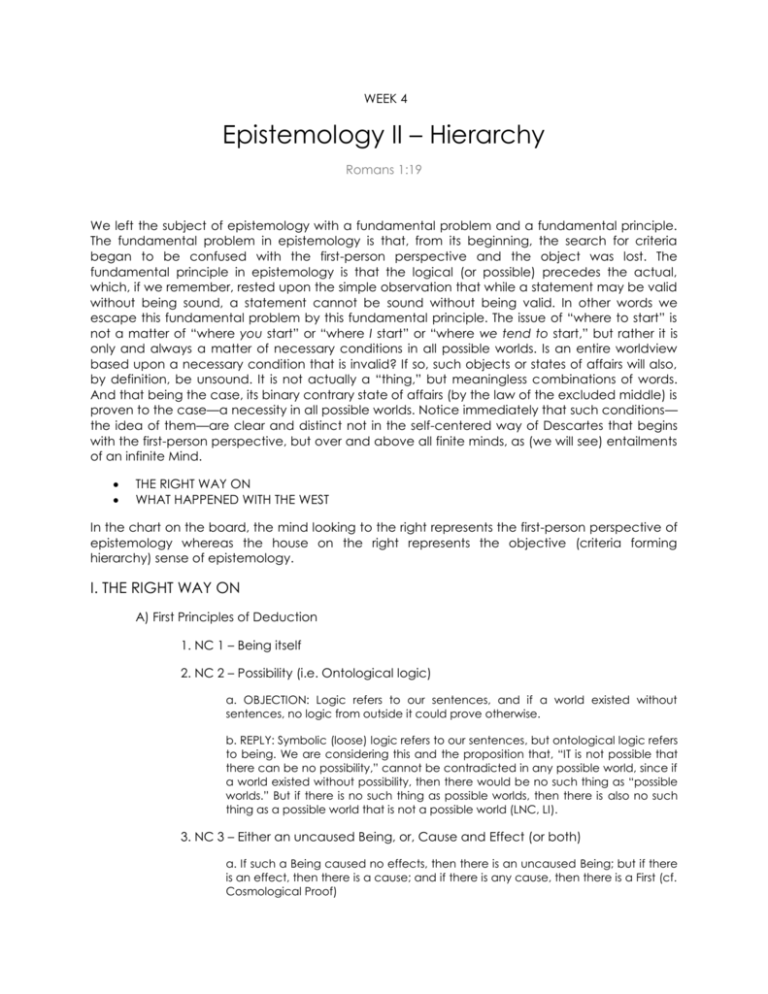
WEEK 4 Epistemology II ² Hierarchy Romans 1:19 We left the subject of epistemology with a fundamental problem and a fundamental principle. The fundamental problem in epistemology is that, from its beginning, the search for criteria began to be confused with the first-­person perspective and the object was lost. The fundamental principle in epistemology is that the logical (or possible) precedes the actual, which, if we remember, rested upon the simple observation that while a statement may be valid without being sound, a statement cannot be sound without being valid. In other words we HVFDSHWKLVIXQGDPHQWDOSUREOHPE\WKLVIXQGDPHQWDOSULQFLSOH7KHLVVXHRI´ZKHUHWRVWDUWµLV QRWDPDWWHURI´ZKHUH you VWDUWµRU´ZKHUH I VWDUWµRU´ZKHUH we tend to VWDUWµEXWUDWKHULWLV only and always a matter of necessary conditions in all possible worlds. Is an entire worldview based upon a necessary condition that is invalid? If so, such objects or states of affairs will also, E\ GHILQLWLRQ EH XQVRXQG ,W LV QRW DFWXDOO\ D ´WKLQJµ EXW PHDQLQJOHVV Fombinations of words. And that being the case, its binary contrary state of affairs (by the law of the excluded middle) is proven to the case³a necessity in all possible worlds. Notice immediately that such conditions³ the idea of them³are clear and distinct not in the self-­centered way of Descartes that begins with the first-­person perspective, but over and above all finite minds, as (we will see) entailments of an infinite Mind. x x THE RIGHT WAY ON WHAT HAPPENED WITH THE WEST In the chart on the board, the mind looking to the right represents the first-­person perspective of epistemology whereas the house on the right represents the objective (criteria forming hierarchy) sense of epistemology. I. THE RIGHT WAY ON A) First Principles of Deduction 1. NC 1 ² Being itself 2. NC 2 ² Possibility (i.e. Ontological logic) a. OBJECTION: Logic refers to our sentences, and if a world existed without sentences, no logic from outside it could prove otherwise. b. REPLY: Symbolic (loose) logic refers to our sentences, but ontological logic refers to being. We are considering this and the proposition that, ´,7LVQRWSRVVLEOHWKDW WKHUHFDQEHQRSRVVLELOLW\µFDQQRWEHFRQWUDGLFWHGLQDQ\SRVVLEOHZRUOGVLQFHLI a world existed without possibility, then there would bHQRVXFKWKLQJDV´SRVVLEOH ZRUOGVµ%XWLIWKHUHLVQRVXFKWKLQJDVSRVVLEOHZRUOGVWKHQWKHUHLV also no such thing as a possible world that is not a possible world (LNC, LI). 3. NC 3 ² Either an uncaused Being, or, Cause and Effect (or both) a. If such a Being caused no effects, then there is an uncaused Being;; but if there is an effect, then there is a cause;; and if there is any cause, then there is a First (cf. Cosmological Proof) B) Epistemic Chains in Noetic Structures 2QH·V noetic structure is just the entire set of propositions one holds to (or the entire set of states of affairs that one holds to ² i.e. the believed actual world of an individual) 2. Epistemic chains are the systemic order (not necessarily the chronological order!) that maNHXSRQH·VQRHWLFVWUXFWXUH$!%!&RU,EHOLHYH&RQWKHEDVLV of B, and I believe B on the basis of A. 3. Now, how is any epistemic chain finally grounded? a. Must it not be so ontologically³by the impossibility of an infinite regress? b. Foundationalism attempted to ground the first principle ultimately in what is indubitable (in other words³NOT on the basis of some other belief);; while Coherentists have simply opted for the perfect circle within their circle: thus coherentists must be internalists. c. Properly basic belief is one which is not justified on the basis of some other belief, such that it is 1) basis, and 2) meets some condition as basic (criteria problem). ´It is only when you are asked to believe in Reason coming from non-­reason that you must cry Halt, for, if you don·t, all thought is discredited. It is therefore obvious that sooner or later you must admit a Reason which exists absolutely on its own.µ C. S. LEWIS, Miracles 4. A Metaphysical proof for a hierarchy of knowledge: a. If we know a thing, then that knowledge is a thing we know RU ´WKDW UHDO NQRZOHGJHµH[LVWV b. A thing we know must be either uncaused or caused;; c. If that knowledge is uncaused, then it has always been known without prior grounds (though, in an omniscient mind, it may be known in reference to all possible grounds). d. If that knowledge is caused, then that causing knowledge 1 was either caused or uncaused;; e. If there is no first cause to that epistemic chain, then there is no second, and no third, and thus no effects (units of knowledge), then there is no such thing as a unity of knowledge;; f. If there is no such thing as a unit of knowledge, then no-­thing is known;; e. If nothing is known, then the statement that nothing is known is unknown. g. Therefore, there is an uncaused First Cause to HYHU\WKLQJZHNQRZ« If we were to go further, we would see that this also proves that this First Cause³or Primal Ground (or Primal Knowledge)³must also either suffer the same infinite regress of grounds, or, else refer to each possible ground simultaneously (Omni-­scientia): since the first is impossible, by the LEM, the second is invincible. 1 See the principle of sufficient reason to see why only a unit of knowledge can render unto its effect a unit of knowledgeͶi.e. nothing can be known that is not a thing, and thus no unit of knowledge can be ground-­‐less (or without reason). The principle of sufficient reason is simply that a cause cannot render to an effect that power which it does not possess. Therefore an Omniscient Mind exists grounding every unit of knowledge. Each unit exists as a unity in this Mind. C) Reason within Revelation 1. Reason (Divine) versus Reasoning (Human) a. We should distinguish between the power of reason (Aristotle ² i.e. what distinguishes man from beast) and the product RIUHDVRQLH$ULVWRWOH·VVWDWHPHQWas a statement). Assuming Aristotle to be correct, then all human beings have the faculty of reason as well as access to it. It may remain unformed or underutilized either by defect or by immorality. b. Then, we should distinguish the source of reason (Word ² revealed) with the participation of reason (Mind ² as a faculty in the soul) 2. Science (Finite) within Omniscience (Infinite) a. Is our knowledge a sub-­set of the knowledge of God? OBJECTION: If one instance of knowledge in our minds were a sub-­VHWRI*RG·VNQRZOHGJHWKHQWKHUe would be a one-­ to-­one correspondence between that unit of knowledge in our mind and that same unit in *RG·VPLQG%XWWKHQZHZRXOGNQRZHYHU\-­thing about that thing. E.QRZOHGJH·V´6RXUFHµ² Ontologically versus Chronologically (in a finite mind) c. Can a unit of knowledge (an act of true knowing) be uncaused? If not, can this process of ground-­consequent go on indefinitely? We have already proven it cannot. But if we have partial knowledge of every part of knowledge, this can still be caused by prior JURXQGVLQILQLWHO\ZLWKRXWFUHDWXUHO\NQRZOHGJHEHFRPLQJWKH&UHDWRU·VNQRZOHGJHDW any point. II. WHAT HAPPENED WITH THE WEST A) From Hume to Kant +XPH·V1DLOLQWKH&RIILQRI5DWLRQDOLW\ a. All our statements must be analytic, synthetic or nonsense ´,I ZH WDNH LQ RXU KDQG DQ\ YROXPH RI GLYLQLW\ RU VFKRRO PHWDSK\VLFV IRU LQVWDQFH OHW XV DVN 'RHV LW contain any abstract reasoning concerning quantity or number? No. Does it contain any experimental reasoning concerning matter of fact and existence? No. Commit it then to the flames: For it can contain nothing but sophistry and illusion.µ DAVID HUME, An Enquiry Concerning Human Understanding b. analytic = a priori / synthetic = a posteriori .DQW·V´5DWLRQDO-­(PSLULFLVPµ Are there not also synthetic a priori MXGJPHQWV"´*RGLVORYHµ a. If we do not assume that knowledge only arises from sense experience, then there is nothing self-­contradictory about a priori synthetic propositions. b. Intuition IXQFWLRQHGDV.DQW·V´WKLUGZD\µVRWKDt we do ´SHUFHLYHREMHFWVLQ VSDFHµVRWKDW´;LVLQVSDFHLQWKDWFKDLUµLVsynthetic because the predicate is not contained in the subject AND is a priori because space is not derived by sensory data as such. c. So Kant defined synthetic a priori judgments as those which are preconditions for other things we take for granted. ´7KDWLVWKHVRXUFHRINQRZOHGJHLQVRPHZD\WUDQVFHQGVH[SHULHQFHZKLOHEHLQJHPEHGGHGLQLW,QWKLV .DQWZRXOGEHFORVHUWRWKHUDWLRQDOLVWVWKDQWRWKHHPSLULFLVWVµ OLIPHINT, 70 G.DQW·Vtranscendental deduction then was not an argument for objective knowledge, but a conditional proof that assumed that: Since we do know, what must be assumed for such knowledge to take place? These categories (12 in 4 more basic divisions) were not metaphysical essences (noumenal) but practical ´UXOHVRIWKRXJKWµ+HQFH.DQW·V´PLGGOHURDGµLVXOWLPDWHO\QRPLQDOLVPE\D different name. H(UJR.DQW·VWKLUGZD\ZDVPHUHO\DXVHIXOWRROWRPDLQWDLQWKHVXSUHPDF\RI unbelieving knowledge wiWKRXWNLOOLQJNQRZOHGJHDVVXFK+HDFFHSWHG+XPH·V assumption that the noumenal cannot be experienced via the intellect. ´,KDYHWKHUHIRUHIRXQGLWQHFHVVDU\WRGHQ\NQRZOHGJHLQRUGHUWRPDNHURRPIRUIDLWKµ.$17 %)URP.DQW·V'LYLGHWRWKH&RQWHPSRrary Divide 1. The Noumenal and Phenomenal Realms 2. Continental Philosophy retained the subjective, and Anglo-­American Philosophy retained the objective³neither with any basis in objective knowledge to do so. That divide is essentially what is meant by the difference between Modernism (Anglo-­American-­Object-­driven) and Postmodernism (Continental-­ Subject-­driven). a. Late modernism (particularly in the positivist / analytical schools) gave us the Verification and Falsifiability principles. But these were a UHJXUJLWDWLRQRI+XPH·VFORVLQJOLQH SPROUL, Ch. 1-­3 1. Is the task of apologetics defensive, offensive, constructive, destructive, or all of the above? How so? 2. Given what we have talked about in terms of acquaintance and description, knowledge and opinion, subjective and objective: where do the three elements of saving faith (22-­24) fall on those spectrums? ,I´:HPXVWDIILUPDYDOLGHSLVWHPRORJLFDOVWDUWLQJSRLQWbefore we undertake a defense of the &KULVWLDQ IDLWKµ WKHQ KRZ LV 6SURXO·V VWarting point different than the Presuppositionalism of *UHJ%DKQVHQ"+HUH·VDKLQW³QRWHWKDW6SURXOLVWDONLQJDERXWD´ILUVWSHUVRQVWDUWLQJSRLQWµRQO\ with respect to the art of apologetics, not its science) 4. What basic epistemological question are the four non-­negotiable principles meant to answer? That being the case, does Sproul think that these are suitable foundational proofs or universally binding first principles? The Four Basic Non-­Negotiable Principles are: 1) The basic laws of logic 2) The law of cause and effect 3) The basic reliability of sense perception 4) The analogical use of language I hope it is becoming clear why we do not make the mistake of criticizing arguments (worldviews) at their consequential level, but at their antecedent lHYHO 7DNH RXW WKH ´VTXDUH-­ FLUFOHµDQG\RXKDYHWDNHQRXWHYHU\WKLQJWKDWLWFRQWDLQV
